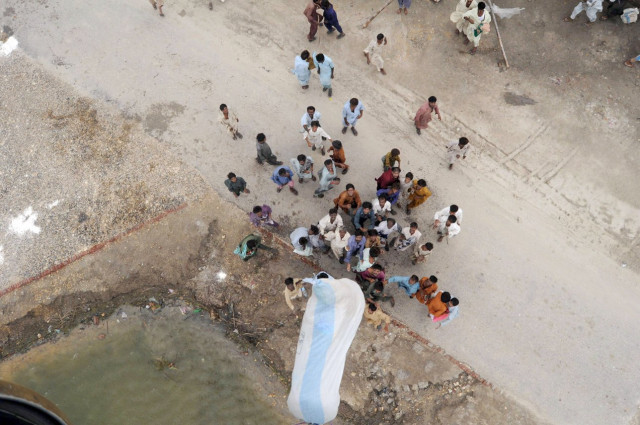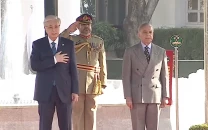As water flows, donors ebb
Millions have been affected but help is slow to trickle in.

As of Friday, 6.5 million people in Sindh have been affected by the floods. Two hundred and sixty-nine people have been killed, including 56 children. Two million acres of crops have been damaged.
But the impact of the disaster has yet to sink in across Pakistan despite television channels beaming footage of flood victims around the clock and appeals from the government.
"I've just pulled out our records to see the response to this year's flood efforts compared to 2010," said Edhi Foundation's Anwar Kazmi. "And the graph has decreased dramatically, by around 70 per cent."
Kazmi says people are just not donating to flood relief efforts.
"It could be economic burdens or something else. People don't donate to the government because they feel their money will go to waste. Edhi sahib has personally gone out on the streets to collect funds as well. He has also asked that if people can just donate one meal's worth of money it could help considerably."
Kazmi says donor fatigue is a factor. He recalls sitting in his office with four volunteers during the 2005 earthquake, fielding calls from all over the world from people desperate to donate.
The phone does not ring as often anymore.
According to Rabayl Manzoor, who works as a policy advisor to the Organisation for Social Development Initiatives, "It's not just flood fatigue, its disaster fatigue. There is a catastrophe every few months."
Manzoor says international non-governmental organisations (NGOs) are still conducting damage assessment and collecting proposals, since a major part of funds have not been released as yet for the United Nations clusters. She also noted that corporations that activated its employees and led flood relief efforts are missing this year.
Oxfam GB's Assistant Country Director Iftikhar Ahmed Khalid says it is too early to assess if donor fatigue has set in.
"The government has only just issued a call, since for the past month it said that it did not require assistance. And that call isn't official as yet since paperwork needs to be issued from the Foreign Office."
While Khalid says it takes time for a public appeal to be implemented, he does anticipate donor fatigue.
"Firstly, there are a lot of other disasters taking place in the world. Secondly, this isn't the first disaster in Pakistan. There was the earthquake, the internally displaced persons crisis and last year's floods. Donors will look into governance and whether there are any sustainable solutions. What we need to look into are our own disaster management mechanisms, because there will be another disaster."
For many NGOs, rehabilitation of the victims of the 2010 floods has still not ended. Edhi Foundation says it is still providing rice to flood-affected areas in Sindh. According to Manzoor, the UN was building one-room shelters and work on that has halted because of the rain and flooding.
According to the National Disaster Management Authority's Lt Col Amer Siddique, it isn't fair to use the word 'fatigued'. "People in the field are overwhelmed, but we are all motivated. This is our job. My team and I have spent half of our Eid holidays at the office."
Khalid asserted this too. "We are excited about starting work. There are a lot of benefits to international NGOs, they expand their professional experience and the organisations grow. I feel more confident now responding to disasters as compared to the earthquake; I know exactly what to do."
Siddique says "we are fighting this through and trying to deliver as much as we can."
He said that NDMA had dispatched 100,000 ration packs to flood affected districts, but vendors and contractors tasked to distribute it had not managed to achieve the target for a variety of reasons including rain, the security situation in Karachi, strikes in Sindh and blocked routes.
"We have a team of people who are constantly in touch with people on the ground, talking to the truck drivers and getting updates on their routes. We're engaged at the lowest levels. Even if we deliver 40,000 packs I'll be happy."
There does not seem to be much of an appetite for media coverage either. According to traffic stats for The Express Tribune's website, the page views of flood-related stories for August 2011 was 5.5% of the views generated by flood-related stories last August.
Published in The Express Tribune, September 17th, 2011.



















COMMENTS
Comments are moderated and generally will be posted if they are on-topic and not abusive.
For more information, please see our Comments FAQ